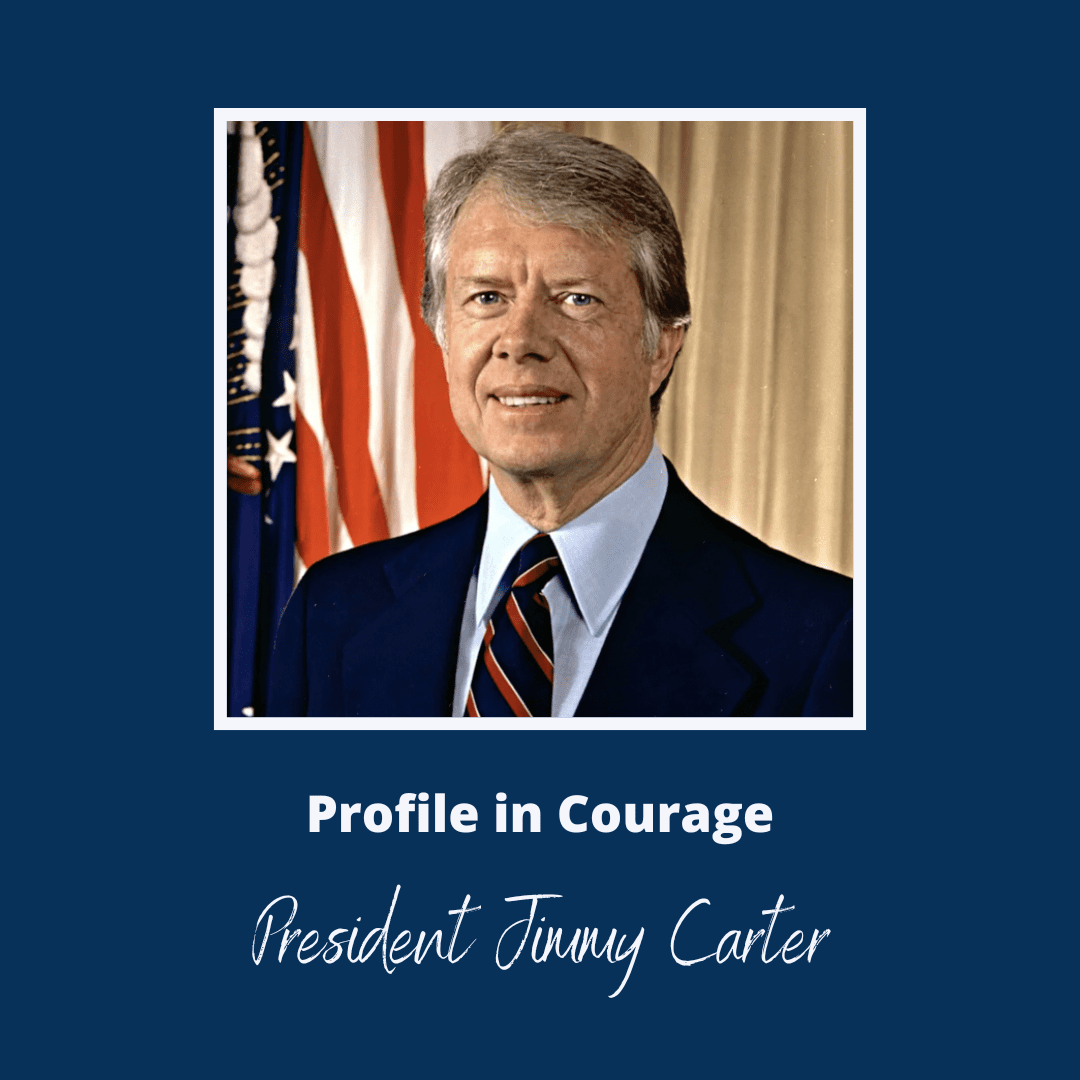
Profile in Courage: Jimmy Carter
Taxpayers Protection Alliance Foundation
January 3, 2025
For most of recent history, politicians and statesmen have mainly been lawyers, well-to-do businessmen, or the offspring of other politicians. Not many national leaders start off as…peanut farmers. Yet, James Earl Carter Jr. was not like most politicians seeking higher office. The 39th President wasn’t afraid to speak out against segregation even when it wasn’t the politically expedient thing to do in Jim Crow Georgia. Despite the “D” next to his name, President Carter worked tirelessly to end costly and outdated regulations and help lay the groundwork for the country’s economic renaissance. For keeping America’s best interests at heart while tending to a jaded and cynical nation, Jimmy Carter was certainly a Profile in Courage. The Taxpayers Protection Alliance Foundation (TPAF) will miss the dearly departed President, and we are holding the Carter family in our thoughts.
Carter’s modest and rooted image was no campaign-era invention. The former President was born in the rural town of Plains, Georgia (which was then home to about 600 people) and raised nearby. His early friendships with black farmhands gave Carter a close-up look at the evils of segregation and the limited opportunities offered to the less-fortune. Carter also got a good feel for farming life and grew and sold peanuts as a teenager. While Carter temporarily left the yeoman life to pursue his dream of attending the Naval Academy and joining the Navy, he returned to farming and agribusiness once his father passed away in 1953.
Droughts and financial difficulties made it difficult to transition from the Navy to farming, but Carter found his legs and successfully expanded his family’s peanut business. As his farming success grew, the young entrepreneur turned his sights toward civic engagement. According to the Carter Presidential library, “He quickly became a leader of the community, serving on county boards supervising education, the hospital authority, and the library. In 1962 he won election to the Georgia Senate. He lost his first gubernatorial campaign in 1966, but won the next election, becoming Georgia’s 76th governor on January 12, 1971. He was the Democratic National Committee campaign chairman for the 1974 congressional and gubernatorial elections.”
As Carter entered the national political scene in the mid-seventies, America was going through an exceedingly tough time. Then-President Nixon resigned after revelations that he had tried covering up the politically motivated break-in at the Watergate Hotel. His successor Gerald Ford then pardoned Nixon and earned the ire of Americans for failing to get soaring inflation under control. Carter set his sights on the presidency, promising beleaguered Americans a return to normal, honest government and a stable economy. The nation responded by sending the earnest Georgian to the White House with 297 electoral votes.
While in office, Carter focused on reforms that would bring down costs for his struggling countrymen. The President set his sights on overregulated industries where a handpicked few players had far too much discretion thanks to bureaucratic missteps. In the aviation industry, fares and route access were controlled by the federal Civil Aeronautics Board. Low-cost competition was essentially outlawed, and the “friendly skies” were anything but friendly for the working class. The rail industry also had a difficult time embracing rate flexibility due to an onerous federal regime, which also greatly complicated contracting for rail shippers and rail carriers. Trucking was similarly stymied by federal rules, which significantly added to the costs of transporting goods across the country. President Carter saw free market competition as a better way to approach economic issues and keep prices under control. He signed a slew of bills from 1977-1981 that deregulated pricing across industry and allowed companies to compete with one another on the same services and contract freely without regulatory scrutiny.
Unfortunately for Carter’s political career, the results were not apparent right away. Market reforms take time to work, and President Carter wasn’t willing to embrace measures such as tax reform (implemented by his successor Ronald Reagan) that would have led to more immediate relief. Continued malaise, coupled with the fallout from the Iranian Hostage Crisis, led to the election of Reagan in 1980. The economy took off a few short years later, thanks to a combination of Reagan’s tax reforms, Carter’s regulatory reforms, and Carter’s wise decision to appoint inflation-hawk Paul Volcker to the Federal Reserve.
Carter was magnanimous in defeat and went on to have a pivotal post-presidency that touched millions of lives. He and his wife Rosalynn built thousands of houses in developing countries and low-income areas as part of Habitat for Humanity, and his work inspired countless volunteers. Carter also founded the Carter Center, which has monitored elections around the world and consistently championed the right to vote. He may have passed on, but his legacy will not be forgotten. TPAF recognizes his contributions toward building a better world and making America the country it is today. Jimmy Carter was and always will be a profile in statesmanship, integrity, and courage.
